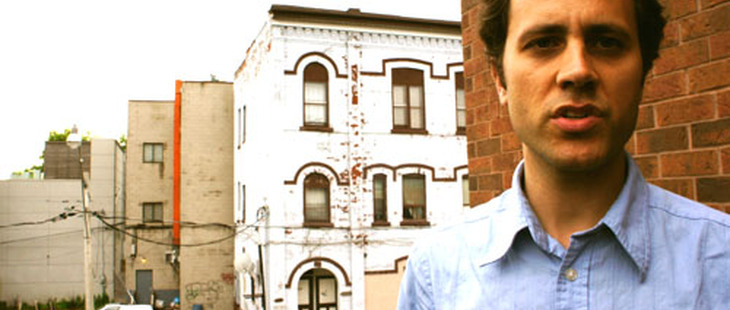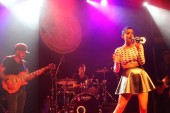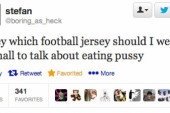

Sandro Perri spent the past decade in quiet ubiquity. A central figure amidst Toronto’s prolific community of improvisational musicians, fluent in the avant-jazz and contemporary-classical that form its patois, the multi-instrumentalist has adopted various names to make sense of all his sonic experiments. As Polmo Polpo, he played droning, dub-smeared electronica; with Craig Dunsmuir, in Glissandro 70, he surveyed multiple eras of entrancing, sweat-inducing beats; and under his government ID came 2007’s Tiny Mirrors, folksy and soulful in disarming proportion.
Impossible Spaces represents his first solo album in four years, and it’s hard to believe that Perri will enjoy a low profile for much longer. The new LP is his most elaborate work to date, working through each musical fixation with mercurial sophistication. (You can hear it streaming here.) Fluid in tempo and tone, sharing only that bruised, gorgeous voice, Perri’s songs build up their dense grooves with beguiling subtlety. Even the quotations sound organic. It’s cosmopolitan in the truest sense: familiarities made new and strange together.
I’m curious about your musical background—what kind of formal training do you have, if any?
The first thing was, I bought a snare drum when I was about 11, and I just played on that for a few months. Then I got an acoustic guitar and messed around on my own for two or three months, and then got a private teacher, and studied with him on and off for three years. So I guess that was between 12 and 15, maybe 16. During that time it was rock and classical guitar that I was studying. And then I took a break from that and sort of studied on my own for two years or so, and that was the most intense period, six hours a day, that kind of thing. Then I got a teacher for about six months just before applying to jazz school, who got me primed to learn more advanced scales and theory and harmony. I got accepted into school, and I was there for about a year and a half—
Which jazz school?
Humber College. I did one full year and one half-year, even though on the first day I wanted to leave [laughs]. It was very conservative as far as I could tell.
So they didn’t know who Ornette Coleman was?
The teachers would have, I guess. But few of the students were into that kind of thing. I managed to find the four or five who were, and we developed friendships and played together. But I got something out of it, I learned quite a bit, and equally important is that I learned what I didn’t want out of school, what I didn’t want to be involved in, which was studying to be a session musician or a straight jazz musician. I knew that I wasn’t really gonna cut it. So I think that was the extent of my actual schooling—the rest, I would just read books at home and practice rhythm exercises. I practiced a lot from this polyrhythm book for a few years. And then just listening. Listening was the main schooling, actually.
I didn’t realize until doing the research for this interview that you had made out-and-out dance music before, as Dot Wiggin and Continuous Dick. Impossible Spaces seems to return to that somewhat, or at least emphasize grooves more than Tiny Mirrors did. There are moments that remind me of Arthur Russell. That wasn’t a question so much as a statement, I guess.
I could treat it like a question.
Sure.
Dot Wiggin was actually a collaboration with a friend of mine, Todd Fox, who’s since passed. I guess he didn’t get me into making dance music, but I think that I became… I don’t know what to say about that. It was very special, that’s for sure. It was definitely an intense six months of music-making. And I learned something about simplicity from him, about space. I was probably trying to be too brainy about it before that. Trying to validate it as “music”. I still suffer from that a little. I don’t think I’ve fully found that thing you need to make great dance music.
The physicality?
The physicality and the simplicity. Structurally strong. That’s a key thing that I still am learning about, and I think all the dance music that I’ve made has just managed to not achieve that but offer enough of an interesting take that people have at least been curious about it. Whereas somebody like Arthur Russell definitely knew how to do those things, and he was a very sophisticated musician, in a more traditional sense. There’s nothing lacking in any of his dance music at all.
In part, the desire to make dance music came as a reaction to being in jazz school, and yet, another part of me was still holding on to those things, which essentially prevented me from jumping right in. Just those mental traps you set up for yourself. The other part was that electronic music was a way of getting out of using my hands, having some sort of dexterity issue to grapple with. I spent years practicing and I had reached a bit of a stalemate. Making beats, on the other hand, was creative in an entirely different way.
My brain needed a different kind of stimulation. It was much more about rhythm and overall construction than about knowledge of harmony. So it was a good way to relieve myself of some pressures that I felt, learning an instrument, becoming good at it. And I realized very quickly that making music is not about playing an instrument, it’s about overall composition, pacing and space and learning how to access some sort of feeling or idea and translating it into sound. Dance music is—I come and go, I’m into making it for a while and then I have a reaction to that, which is too much button pushing and not enough physical engagement. Not enough singing, not enough playing. There’s always a swing back and forth. So maybe I’ve come the closest to combining the two in this record.
You recently travelled to Bruce Peninsula with John K. Samson [of the Weakerthans] and Christine Fellows for the National Parks Project. What was that like, composing in the wilderness with them?
It was great. It was very interesting because it became apparent almost immediately that being out there removed the need to create. I don’t know if that’s factually, technically irony, but the whole point of going there to create in the wilderness was erased, for me anyway, as soon as we got there. It made it very evident that a big part of the impetus to create is living in the city… or maybe being away from nature, creates this need for your own natural space.
I’m not outdoorsy, per se, but something definitely changes in my nervous system when I go out into the woods. It does for anybody, I think. So that was amazing, and I felt no pressure to create at all, and I ended up writing a song the fastest I’ve ever written one, in like ten minutes, just because I really wanted to go swimming [laughs]. And it was really good to hang out with John and Christine, because I didn’t know them, and they were really nice people. We had a great time. I learned a lot about creativity there. I cracked open the reasons why I want to create things. I find I’m always reminded of basic needs when you go out and you’re surrounded by nature and you don’t have any buildings around, you don’t have any concrete around—
Not to get all R. Murray Schafer or anything, but the change in acoustics alone must have affected—
Oh yeah. There was this one really exciting moment where we were in the water, trying to record the sound of this—you know when you’re doing your dishes, and some water gets into a metal bowl, and you hit it and it goes doink? It’s an amazing sound. And so we were trying to do this in the water, we were trying to record this sound in this bowl. I happened to have my nylon-string guitar with me, and I was holding it in a certain way, and the wind grazed the strings and excited the strings and these upper harmonics just all of a sudden came out of the guitar. It was this crazy, whistling-wind-chime sound that I’d never ever heard in my life. I didn’t know that wind on guitar strings could do that.
We all just kind of went “Oh my God” and recorded the sound of this guitar. It was really delicate, because I couldn’t move. If I moved a millimetre the sound would have stopped. I had to stay there holding this guitar. I think that ended up on the vinyl version of the album that they released. But that was a great moment, because we weren’t really doing anything.
Page 2 of 2
The idea of just discovering this unheard sound is so…
Yeah, especially when you have nothing to do with it, because then it’s really a mystery.
Interpolation recurs throughout your music in general, Plays Polmo Polpo being the most obvious example. But the final track onTiny Mirrors reinterprets the first one, and while “Changes” is hardly a cover of its famous namesake, you are winking at Bowie with those stuttered vocals, right?
Yeah, probably. Possibly. I think that it’s hard to pretend as if other music doesn’t play a part in the music that you make, films or books or whatever. I like the idea of talking about what you’re talking about, maybe, acknowledging the fact that you could be referencing things. To me “meta” is not a dirty word. There is value in understanding the context of listening, and referencing other things that you’ve heard in the past is an important element in understanding what you’re hearing now and how you’re taking it in.
“Wolfman” uses this symbol of semi-human monstrosity as a way to explore awkwardness and hesitation. How did those things become associated in your mind? It doesn’t seem like a horrific or violent situation, just one of…misunderstanding.
Yeah, I think you’re hitting on some of the things that are there, for sure. Anything that could be considered monstrous is really born out of very human experience. I mean, the whole idea, the whole myth of the wolfman is essentially a human who has not been able to fully embrace what it means to be a human being, in terms of vulnerabilities that one has to deal with.
I guess if you think about it in a scientific sense, the myth may have been fed by—I can’t remember its name, but you know that rare medical disorder where you’re covered in hair? I’ve seen that talked about as a hypothesis for what inspired werewolves. And that persists today—they’re not seen as monsters, but they definitely are gawked at and stigmatized.
I guess the whole thing with the idea of monsters is that there’s the unknown, which is of course terrifying, and then there’s the fact that you recognize something of yourself in the monster. That’s terrifying as well. There are a few other things in that tune. There’s an attempt at humour in that song, and there’s also a nod to the whole wolf thing that happened a bunch of years ago, [when] everybody had “wolf” in their band name but nobody ever explicitly talked about what that meant, what conditions that arose from. There’s a quote from that Will Oldham song [“Wolf Among Wolves”]—that song actually has a lot of quotes from other music, it probably has the most of what you were talking about with “Changes.” It’s loaded with quotations and licks from other songs, almost entirely.
Maybe more like Frankenstein than the Wolfman.
Yeah, exactly [laughs]. Another monster. If you were to meet a wolfman, it would definitely be awkward. [The song] doesn’t just present a situation where you’re afraid of this monster. It tries to show an extreme vulnerability there that this thing or this person has so much trouble dealing with—this aggressive, monstrous character in order to cover that up.
It reminds me of the Mountain Goats—John Darnielle’s band?
Oh, I’ve never actually heard that band. I know that you and Carl Wilson are big fans.
A lot of his songs touch on monstrous subjects, but in a nuanced or counterintuitive way. With “Wolfman” I was specifically thinking of a song called “How to Embrace a Swamp Creature,” which is about arriving at the apartment of somebody you probably shouldn’t be sleeping with.
Yeah, I don’t know them, but I should probably check it out. Lyrics are a hard thing for me. They’re very difficult to write, I find. I wish that was my forte, but—that was actually the first song where I made an attempt at a story format. That’s probably where some of the awkwardness comes from.
By the conclusion of Tiny Mirrors, with “Mirror Tree,” you left the floor to your collaborators—you don’t appear on it at all. There’s a sense of absence at the end of Impossible Spaces as well; you’re there, but Jordan Somers [a friend of Perri’s who died of complications from leukemia in 2008], who co-wrote the title track’s lyrics, is not. It’s very moving, if you know the backstory.
Well, thanks. That was the first time I ever allowed myself to collaborate on lyrics with another person. It was definitely the level of trust for both of us that allowed it, because he hadn’t done that either. It was all in one session, an hour or so, and mostly we were just laughing, actually. We were coming up with really stupid things, funny things, and then some of the things that remained are what fleshed out the song. We were quite close. It was unavoidable that there would be a lot of elements in this record about dealing with his death. A lot of it is what you think about afterwards and what could’ve happened, all the stuff that’s just impossible to grasp. When somebody’s gone, you can’t reach those things, but you continue to try and grasp them.
Was he already ill when you wrote the lyrics?
No, I started writing the lyrics a long time ago, probably 2005. They just kind of sat there for a couple of years, I didn’t do anything. Like anybody who writes or makes music, there’s a whole load of stuff that’s constantly being worked on or just sitting there waiting to be used. This song was one of them: we got together in 2008, maybe 2007, and I brought that out. He offered up a few things that he had in his notebook, that he had already written, and then we sort of meshed them together. He wasn’t sick then, but he got sick very shortly after we did that.
“How Will I?” was written for him, right?
It’s written about what happens when somebody in your life dies, all the things that go through your mind and how you try to deal with that. So it was both for him and about him.
There’s that feeling of solidarity in the chorus: “Hand in my hand, shoulder to shoulder / Today it looks like love is bolder.”
I don’t know if I should be this explicit about it, but that’s quite literally about standing over his grave and being with my partner and realizing that you can lose somebody very close to you, but it’s really important in that moment to remember who you do have in your life as well, to contextualize the idea of loss. It reminds you of what you haven’t lost. And then the end of that song, where it gets a little insane and ridiculous, is all of the things that people end up doing to grapple with losing somebody. Doing anything creative is really a way to prolong that, to stave off that mortality.














